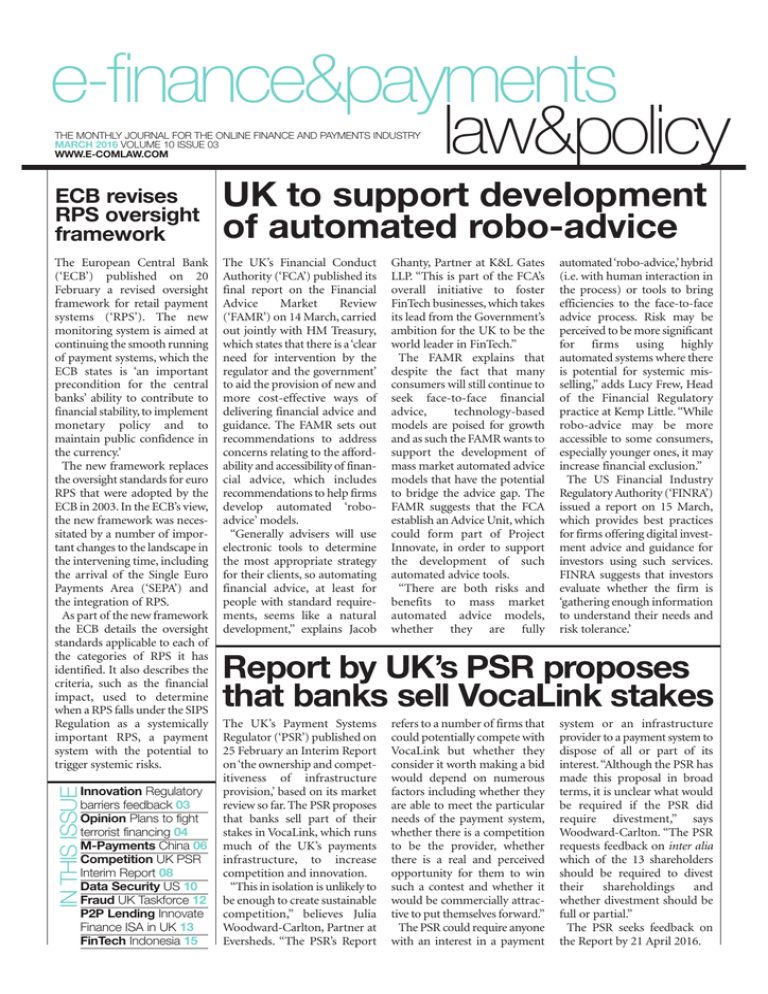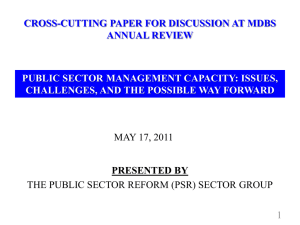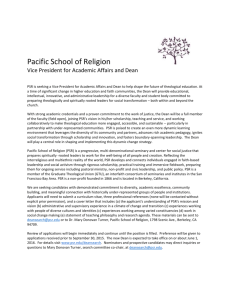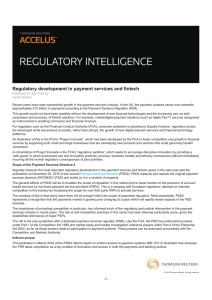Document 13516873
advertisement

ÉJÑáå~åÅÉCé~óãÉåíë ä~ïCéçäáÅó THE MONTHLY JOURNAL FOR THE ONLINE FINANCE AND PAYMENTS INDUSTRY MARCH 2016 VOLUME 10 ISSUE 03 WWW.E-COMLAW.COM ECB revises RPS oversight framework The European Central Bank (‘ECB’) published on 20 February a revised oversight framework for retail payment systems (‘RPS’). The new monitoring system is aimed at continuing the smooth running of payment systems, which the ECB states is ‘an important precondition for the central banks’ ability to contribute to financial stability, to implement monetary policy and to maintain public confidence in the currency.’ The new framework replaces the oversight standards for euro RPS that were adopted by the ECB in 2003. In the ECB’s view, the new framework was necessitated by a number of important changes to the landscape in the intervening time, including the arrival of the Single Euro Payments Area (‘SEPA’) and the integration of RPS. As part of the new framework the ECB details the oversight standards applicable to each of the categories of RPS it has identified. It also describes the criteria, such as the financial impact, used to determine when a RPS falls under the SIPS Regulation as a systemically important RPS, a payment system with the potential to trigger systemic risks. IN THIS ISSUE Innovation Regulatory barriers feedback 03 Opinion Plans to fight terrorist financing 04 M-Payments China 06 Competition UK PSR Interim Report 08 Data Security US 10 Fraud UK Taskforce 12 P2P Lending Innovate Finance ISA in UK 13 FinTech Indonesia 15 UK to support development of automated robo-advice The UK’s Financial Conduct Authority (‘FCA’) published its final report on the Financial Advice Market Review (‘FAMR’) on 14 March, carried out jointly with HM Treasury, which states that there is a ‘clear need for intervention by the regulator and the government’ to aid the provision of new and more cost-effective ways of delivering financial advice and guidance. The FAMR sets out recommendations to address concerns relating to the affordability and accessibility of financial advice, which includes recommendations to help firms develop automated ‘roboadvice’ models. “Generally advisers will use electronic tools to determine the most appropriate strategy for their clients, so automating financial advice, at least for people with standard requirements, seems like a natural development,” explains Jacob Ghanty, Partner at K&L Gates LLP. “This is part of the FCA’s overall initiative to foster FinTech businesses, which takes its lead from the Government’s ambition for the UK to be the world leader in FinTech.” The FAMR explains that despite the fact that many consumers will still continue to seek face-to-face financial advice, technology-based models are poised for growth and as such the FAMR wants to support the development of mass market automated advice models that have the potential to bridge the advice gap. The FAMR suggests that the FCA establish an Advice Unit, which could form part of Project Innovate, in order to support the development of such automated advice tools. “There are both risks and benefits to mass market automated advice models, whether they are fully automated‘robo-advice,’ hybrid (i.e. with human interaction in the process) or tools to bring efficiencies to the face-to-face advice process. Risk may be perceived to be more significant for firms using highly automated systems where there is potential for systemic misselling,” adds Lucy Frew, Head of the Financial Regulatory practice at Kemp Little. “While robo-advice may be more accessible to some consumers, especially younger ones, it may increase financial exclusion.” The US Financial Industry Regulatory Authority (‘FINRA’) issued a report on 15 March, which provides best practices for firms offering digital investment advice and guidance for investors using such services. FINRA suggests that investors evaluate whether the firm is ‘gathering enough information to understand their needs and risk tolerance.’ Report by UK’s PSR proposes that banks sell VocaLink stakes The UK’s Payment Systems Regulator (‘PSR’) published on 25 February an Interim Report on ‘the ownership and competitiveness of infrastructure provision,’ based on its market review so far. The PSR proposes that banks sell part of their stakes in VocaLink, which runs much of the UK’s payments infrastructure, to increase competition and innovation. “This in isolation is unlikely to be enough to create sustainable competition,” believes Julia Woodward-Carlton, Partner at Eversheds. “The PSR’s Report refers to a number of firms that could potentially compete with VocaLink but whether they consider it worth making a bid would depend on numerous factors including whether they are able to meet the particular needs of the payment system, whether there is a competition to be the provider, whether there is a real and perceived opportunity for them to win such a contest and whether it would be commercially attractive to put themselves forward.” The PSR could require anyone with an interest in a payment system or an infrastructure provider to a payment system to dispose of all or part of its interest.“Although the PSR has made this proposal in broad terms, it is unclear what would be required if the PSR did require divestment,” says Woodward-Carlton. “The PSR requests feedback on inter alia which of the 13 shareholders should be required to divest their shareholdings and whether divestment should be full or partial.” The PSR seeks feedback on the Report by 21 April 2016.




